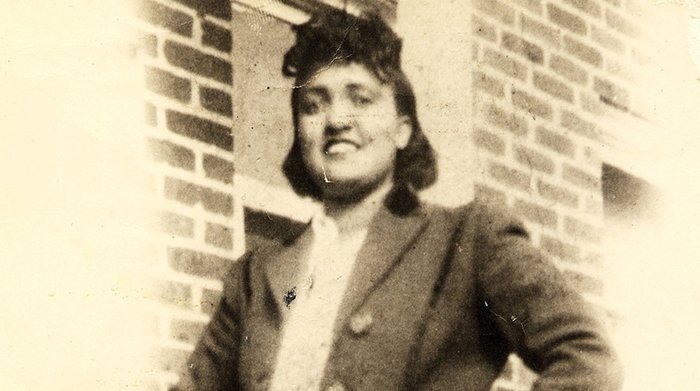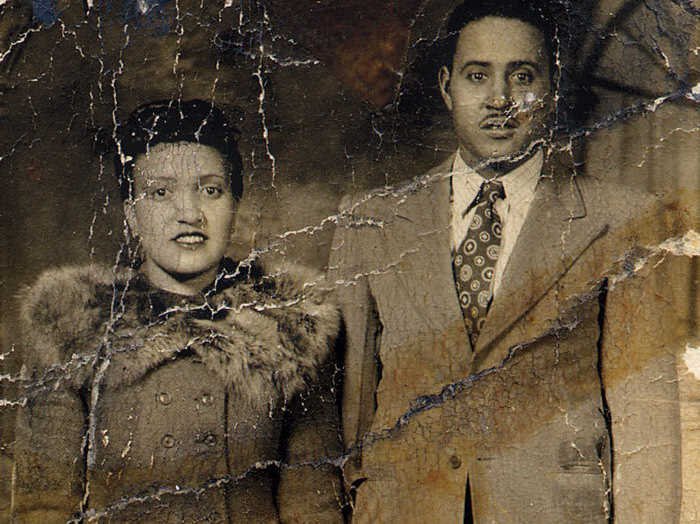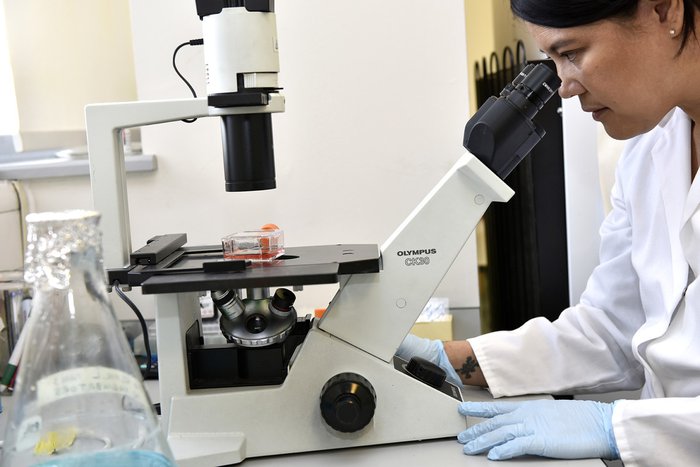The stolen legacy of Henrietta Lacks
Taken without her consent, Henrietta's 'immortal' cells have had an everlasting contribution to research – while raising important issues around medical ethics and patients' rights. Henrietta's death was the start of a long battle for justice, but 70 years later, Henrietta's family finally received closure.

Henrietta Lacks, photograph courtesy of the Lacks family
Henrietta was an ordinary girl from Virginia
Born in 1920 to a poor African-American family, Henrietta spent much of her childhood with her grandfather, Thomas Lacks. They lived in a log cabin that was once the slave quarters on a plantation formerly owned by Henrietta's white great-grandfather and great-uncle.
Henrietta never left the house without a neatly pleated skirt. She had hazel eyes, often wore red nail polish, and loved to cook. Growing up in a time of racial segregation, Henrietta attended a school designated for black children only, before dropping out to work full-time on a Tobacco farm to support her family.
During this time she gave birth to the first of her five children with husband David "Day" Lacks, but in 1950, four and a half months after her final child was born, Henrietta was diagnosed with an aggressive cervical cancer – and would unknowingly spark a revolution in medical research.

Henrietta and her husband David, photograph courtesy of the Lacks family
A grave injustice
Henrietta sought treatment from the only hospital in the area that accepted patients of colour, Johns Hopkins Hospital. She received treatment for 9 months, but in 1951, at the age of 31, Henrietta sadly succumbed to her cancer. She was buried in an unmarked grave in the family cemetery.
That should have been the end of Henrietta's story.
However, during her treatment, doctors had taken samples of her cancerous tissue without her knowledge or consent. Researchers had, until then, been unable to keep tissue samples alive in the lab for more than a few days.
But now they had discovered something truly unique.
Henrietta’s cells were like nothing they'd ever seen
Unlike other cancer cells, Henrietta’s cells had the extraordinary ability to divide and multiply outside of the human body – they were "immortal" in this regard.
Henrietta's cells had a massive impact in blood cancer research, as they led to advancements in chemotherapy – a treatment which continues to save the lives of millions of people with blood cancer.
Henrietta's cells were shared with the worldwide research community, who conducted experiments and made groundbreaking scientific discoveries – particularly in the field of cancer research.
Her cells, nicknamed the ‘HeLa’ line were used to study cancer cell behaviour, test new drugs and help in the development of new treatments.
The HeLa cells had a massive impact in blood cancer research as they led to advancements in chemotherapy – a treatment which continues to save the lives of millions of people with blood cancer.

Henrietta's cells have had an everlasting contribution to blood cancer research
A family left in the dark for decades
Despite Henrietta being at the centre of a medical miracle, her family were never informed about the use of her cells in research and remained in the dark about their mother’s life-saving legacy for decades.
In wasn't until 1973, when a scientist contacted Henrietta's children looking for blood samples, that the family learned that their mother's cells were being experimented with in labs across the globe.
The family's concerns were ignored for years, and in 2013 researchers publicly shared the genome of the HeLa cells for anyone to download.
Righting a historical wrong
The Lacks family continued to fight for their mother's legacy, and in time, they came to an agreement that rather than being publicly available, researchers who wanted to use the data from Henrietta's genome should apply for access and report each year on their findings.
And in 2023, the Lacks family settled a lawsuit with a pharmaceutical company who had profited massively from Henrietta's cells – though the terms of the settlement remain confidential.
Lacks' legacy
Henrietta's story is often invoked in conversations about medical ethics, informed consent and patients' rights in research.
Though she was buried in an unmarked grave, Henrietta has since been honoured with plaques, statues and street names around the world. Today the HeLa cell line continues to be used by researchers – her cells were crucial in the fight against polio, helped develop the covid vaccine, and have even travelled to space.
Henrietta Lacks is an unsung hero of medical research, and will be remembered forever for her unknowing but invaluable contribution to science and humanity.
Inspired to find out more?
Why not read The Immortal Life of Henrietta Lacks by Rebecca Skloot
or check out the TV movie starring Oprah Winfrey.
Want to read more articles like this?
Sign up to our enewsletter to receive updates direct to your inbox.
We will keep you updated about our work and the ways you can help, including campaigns and events. We promise to respect your privacy and we will never sell or swap your details.
